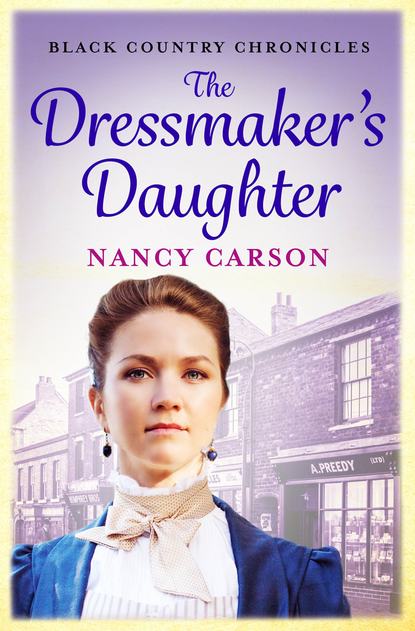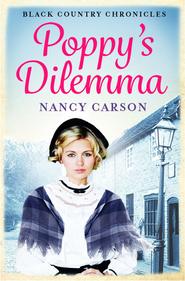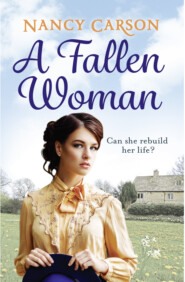По всем вопросам обращайтесь на: info@litportal.ru
(©) 2003-2024.
✖
The Dressmaker’s Daughter
Настройки чтения
Размер шрифта
Высота строк
Поля
Chapter 2 (#u87c75096-38ed-536b-87b5-2b4e26d82dba)
Sunday’s fine weather continued into Monday. Lizzie Bishop walked to work without her coat, her head swimming with dreams and fantasies. The brief, romantic adventure last evening with Stanley Dando was devouring her. It had been so unexpected, but she had relished every minute. In a flash, her emotions had been relentlessly stirred like leaves in a gale, and it was heart-stopping. Now she could hardly wait to see him again, especially after they’d been so abruptly parted when the families went their separate ways. If only she could summon the patience to wait till Wednesday, when they would walk together across the fields by the Oakham farms to the Dingle, where it would be quiet and secluded. She hoped more than anything that he would have the courage to kiss her.
Stanley had set something in train that excited her beyond all expectations. Now she was determined that nothing could stop them or divert them. Strange, she thought, how she’d known Stanley all her life; but not until recently had she thought of him as anything other than family. His dark curls, his even teeth, and his lovely, lovely lips would surely break the hearts of a good many girls. It was up to her to make sure no one else had a chance. Stanley was drawn to her, too, just as surely as a buck is drawn to a doe; that much was obvious. And her eager appetite had been whetted enough.
The clatter and whine of an electric tram travelling through the Market Place roused Lizzie from her daydreams. Stall-holders were loading their trestles beneath the red and white awnings with everything from fruit, vegetables and rolls of velvet, to brass fenders, lamp oil and crockery. Horses clip-clopped over the cobblestones, drawing rumbling carts, and a motor car spluttered as it passed circumspectly in the direction of St. Thomas’ tall spire at the top of the town. A man riding to work on a bicycle took pains to avoid getting his narrow wheels caught in the tramlines. Already, awnings were out over many of the shop fronts and Lizzie could see others being drawn down. A hawker was selling fly papers outside the front door of E. C. Theedham’s, Ironmongers and Cutlers, where she worked, and bid her good morning.
She saw May Bradley walking towards her from the opposite direction, and waited. They entered the shop together and headed for the passageway at the rear where they generally hung their coats. Today, they had only their baskets to deposit before entering the small back-room to titivate their hair. May looked at herself in the mirror and rearranged a wayward wisp. Despite their age difference the girls got on well. They first met when Lizzie started this job, some couple of years ago, and soon they began to meet socially.
May was down-to-earth, with a ready smile, and a wit that was at first beyond Lizzie. She was an attractive girl with a slender waist and an ample bosom, and she had an abundance of dark, wavy hair that framed a pleasant but hardly striking face. When Lizzie invited May home to tea one Sunday afternoon to meet her mother, it was Joe Bishop, her brother, then twenty-two and looking more like his late father every day, who monopolised the conversation, amusing May with his humorous quips. Later, when it was time for May to leave, Joe offered to escort her home, since it was dark. He insisted there was no need for Lizzie to trouble herself accompanying her friend. May accepted bashfully, thanked Eve for her hospitality, and that was the beginning of their courtship. Eve was hopeful that Joe had found himself a nice, homely girl, at last.
May turned away from the mirror to speak to Lizzie. ‘When you was at church last night with your mother, me and Joe went for a drink in The Junction, and while we was in there, we saw Arthur Dowty, your next door neighbour. He says as how him and Bella am flittin’. He says it’s ’cause of Jack Hardwick’s pigs. Anyroad, when we got back I said to Joe as we ought to think about rentin’ that house ourselves. If we could have it, we’d get married. That way, we’d still be close to your mother.’
Lizzie fastened the ties of her pinafore behind her. ‘Wouldn’t the pigs bother you as well?’
‘Oh, I’m used to pigs. Me father always kept pigs. He’s a pig himself. Anyroad, if the pigs was there afore we, we couldn’t rightly complain.’
Lizzie shrugged. ‘I suppose not. But how soon are Bella and Arthur flitting?’
‘As soon as they find somethin’ else, they said.’ May continued to fiddle with her hair in the mirror. ‘There’s plenty houses to rent. It shouldn’t be long.’
Lizzie’s smiling eyes lit up her face. ‘Another wedding to look forward to. Oh, I’m that happy for you, May. I’m sure that our Joe’ll make you a lovely husband, though I say it myself.’
‘Yes, and if you get him a big enough piece of wood, I daresay he’ll make you one, Lizzie.’ May tried to keep a straight face.
‘Oh, I think I’m a bit too young yet, May,’ Lizzie replied innocently, not having caught the humour in May’s comment. Then she said coyly, ‘I think me and Stanley Dando might start courting, though.’
‘Oh, young Stanley, eh? What’s brought that on?’
Lizzie sat down and explained excitedly how Stanley had all but abducted her to the back pew in church, even held her hand, and told her that cousins could marry. But she failed to say that her mother seemed not to approve.
‘Well, he seems a pleasant enough lad. He’s nice lookin’, an’ all, there’s no two ways. But remember you’m only sixteen, Lizzie. It’s no good courtin’ serious at sixteen.’
‘I know that. But when I’m eighteen, I’ll be old enough to get wed. That’s less than two years off. A good many girls get wed at eighteen.’
‘Not if they’ve got any sense they don’t. It’s generally ’cause they’ve got to if they’m that young. You’d break your mother’s heart if that happened, you know. Just remember she’s been through all that before with your sister Maude. And look what happened to her.’
‘Oh, May, I wouldn’t do anything like that. What sort of girl d’you think I am?’
‘Like any other, I daresay, so liable to get carried away.’
When Lizzie left school at twelve years old she had found a job at the Dudley Bucket and Fender Co-operative and made a friend of another girl, roughly the same age, called Daisy Foster. They soon bettered themselves at another firm, operating small guillotines, cutting coils of brass into lengths ready to be pressed into parts for paraffin lamps. They stayed for two years, not just learning the job, but learning about life, listening to the other women gossiping over the hollow rattle and thumps of hand presses, and the fatty smell of tallow. Most of the girls they worked with were older, and Lizzie was amazed at the unbelievable things some of them used to tell her about their men, the amazing antics they performed with them and, most surprisingly, how often. Lizzie didn’t know such things were possible, but it all sounded intriguing. Those girls told her things she would never have known about had she stayed at home. By autumn, however, the two girls had tired of the oil lamp factory, and found jobs at Chambers Saddlery in Hall Street. Lizzie, however, did not take to working with leather and its dark, sickly odour, whereas Daisy did. Thus they split up when Lizzie left to seek other employment.
‘I know a lot of girls do do it, May … you know? … before they get wed I mean … But I wouldn’t, even if I wanted to. I’d be too afeared of getting caught.’
‘Yes, well … It’s somethin’ you need to bear in mind, Lizzie.’
‘Do you and our Joe do it, May?’
May registered no outward change in her expression, continuing to preen herself. ‘That’s between Joe and me.’
‘Well, have you ever done it? With anybody, I mean?’
‘Lizzie! Honestly!’
‘It isn’t that I’m being nosy,’ Lizzie persisted, trying to justify her questioning, ‘but I can talk to you about things. I’ve got nobody else to talk to, and I want to know about things like that. I want to know what it’s like, and everything. I need to talk to somebody about it.’
May turned round and grabbed her pinafore from the hook on the back of the door. ‘You’ll learn soon enough when you do get wed, Lizzie, and not before if you want my advice. There’s no rush … Tell me about Stanley, eh?’
Lizzie smiled again, modestly. ‘I keep thinking about his lips, May … and how much I want him to kiss me. I only have to think about him and my legs go all wobbly. D’you think I’m falling in love?’
May shrugged. ‘So you’m not interested in Jesse Clancey any more?’
‘Well I would be if he’d asked me out. But he seems more interested in our Sylvia.’
*
Kates Hill lay about a mile south east of Dudley town centre, overlooked only by the old Norman castle on the next high ridge. It was a warren of narrow cobbled and muddy streets, each like a gorge, lined with rows of red brick terraced houses and little shops. Some of the streets were steep, others only gently inclined. Not one could you claim was flat, and few failed to host at least one public house. The houses, many of them back-to-back, were built during the early part of the nineteenth century to house the influx of workers who came seeking jobs in the burgeoning foundries, forges, coal mines and ironworks. There were many other factories tucked away, small concerns, some squeezed between houses, some crammed at the back of them, or down alley-ways that the ever-present wind funnelled heedlessly through. Most were concerned with the shaping of metal. Furnaces still glowed in many streets after dark as workers toiled on, striving to earn a few pence extra to bring some comfort to their spartan lives. Three brass foundries and a forge all stood within shouting distance of each other, so there was always the sound of hard work within earshot; the ringing of metal; the steady, reassuring gasps of Boulton and Watt steam engines built practically next door in Handsworth. Everywhere a great confusion of chimney stacks volleyed columns of grey smoke up into the obliging sky.
The Bishops’ house was roughly in the middle of an unbroken terrace that ran the whole length of Cromwell Street on one side. It was not a regular terrace, though. Some houses, those inhabited by better off families, stood further back from the horse road than others, with iron railings at the front and long flights of stone steps up to the painted gates of their entries. The Bishops’, however, was none such; their front doorstep directly met the footpath with its criss-crossed, blue, paving bricks.
There were three bedrooms. Two were on the front, one of which was a box-room where Lizzie slept. At one time she and her sister Lucy used to share it, till Lucy found a job at the Station Hotel which meant her living-in. Her three brothers used to share the bed in the other little front bedroom, to raucous guffaws and irreverent cursing, especially at bed time in winter if they were arguing over who should warm his feet first on the wrapped fire brick. She could hear just about everything through the thin wall of wooden laths that separated her from them. But, nowadays, all was quiet. Ted and Grenville had wed and moved out, which meant that Joe had the bed to himself.
When she parted her curtains in a morning, Lizzie could see St. John’s church in the middle distance through the gap between The Sailor’s Return public house and the brass foundry opposite. Beyond the church was the castle keep, looming grey over the trees at the top of its steep, wooded hill.
To Lizzie, the castle seemed no higher than Cromwell Street. Indeed, tradition had it that Oliver Cromwell himself had supervised the castle’s destruction from that very spot, because of its elevation; hence the street’s name. Certainly, Cromwell’s forces besieged it from these heights.
The back bedroom, overlooking the yard, was where Eve slept in her big, brass bed. The scrubbed, wooden stairs rose directly from the scullery into that bedroom, so access to the others was through it. When Isaac, their father, was alive they all had to be home and in bed before it was time for him to retire. If any of them came home after he went to bed, they were condemned to sleep all night on a chair in the scullery, or face the verbal equivalent of a firing squad for disturbing him.
Downstairs, the scullery seemed all cupboards and doors, from floor to ceiling, of brown varnished wood; a door to the stairs with a single stair jutting out, and next to it the cellar door. There was the middle door as well, to the front room that seemed only ever to be used for weddings, for funerals, or at Christmas time. A chenille fringe adorned the edge of the mantel shelf, and Eve laid a matching cloth on the table every Sunday, without fail.
Isaac had always ruled the roost. Because he was the main breadwinner, his needs and desires came first, though none of the family ever wanted for anything. His job had always paid a steady wage, and with other sons working many neighbours envied their standard of living. Meals were regular and substantial, and they always had good clothes and stout shoes to wear, even if they were shared from time to time.
It was not until some time after her father’s funeral that Lizzie began to miss him and his death started to have any real meaning. The evenings at home in their small house were quiet as she and her mother sat companionably in front of the coal fire that burned agreeably. Joe, her youngest brother, was nineteen then and, whilst he had a steady job in a forge and handed over his money every Friday night, it was hard work, and to relax he was out drinking with his friends most evenings. Lizzie missed her father’s wit. She missed his presence; the little things, like his cursing if anyone accidentally nudged him while he was shaving with his cut-throat razor in front of the fire, and his mug on the mantelpiece. She missed the aroma of Turner’s Brass Foundry that used to linger on him when he came in from work. She missed him polishing her boots at night. She missed all sorts of things.
After the funeral she would daydream, reading by candle light in the prevailing silence but, when she glanced at her mother sitting quietly in her high-backed chair, she would sometimes see the firelight reflected in tears rolling down her cheeks. She would watch Eve lift her spectacles without a murmur and wipe her eyes with a dainty handkerchief, then return to her newspaper, which she always scoured from front to back, whispering every word she read. Lizzie began to understand even then that those tears were not just for her father; they were for all the other loved ones lost, perhaps for opportunities lost. Sometimes, she was moved to weep herself, but she would stifle the tears and put on a brave smile, then go over to her mother and give her a hug.
Lizzie had been confused by her mother’s reaction, though. She had grieved more at the loss of Major, the son who died of enteric fever in a field hospital in Bloemfontein during the Boer War.
*
On the Wednesday, May came to tea, as was lately her custom. She arrived with Lizzie during the afternoon, since every Wednesday they were both given a half day off. May liked to spend time with Eve, black-leading the fire grate for her before lighting the fire, and sitting out on the yard in the sunshine on chairs taken from the scullery, peeling potatoes. When Joe returned from his chainmaking, Eve served up liver faggots and grey peas with boiled potatoes. When they had finished eating and everything had been cleared away, they informed Eve that the Dowtys’ house might become vacant over the next week or two.
‘If the landlord agrees to rent us the house next door, we’ll do it up and get married. What d’you say to that, Mother?’
Eve smiled, a self-satisfied smile. ‘It’s about time, our Joe. And you won’t find e’er a nicer wench, either.’
He looked proudly at May. ‘So we’ve got your blessing?’











